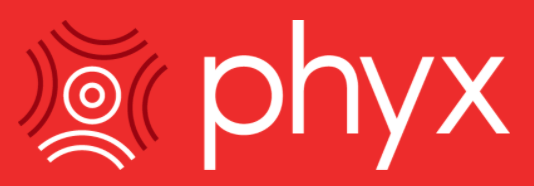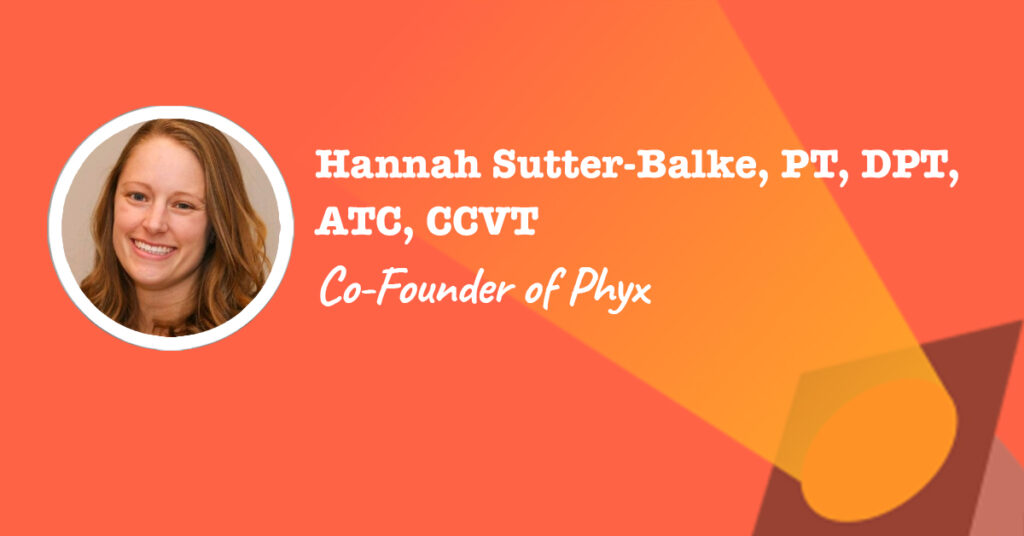In honor of PT month, we’re featuring the co-founder of Phyx, an online physical therapy platform. If you love direct patient care but struggle with the standard model of grinding in a clinic, you’ll love this spotlight!
This post may contain affiliate links or codes. This won’t increase your cost, but it helps keep TNCPT alive, and free of annoying ads! Thank you for your support. 🙂
What is your full name and title at your current job?
Dr. Hannah Sutter-Balke, PT, DPT, ATC, CCVT
Co-Founder of Phyx, an online physical therapy platform

Where are you located?
I currently live and work in Southeast Wisconsin, where Phyx was launched.
Where did you go to PT school, and what year did you graduate?
University of Wisconsin-Madison, Class of 2017
What did you do when you first finished school, and for how long?
Right out of the gate, I took a travel contract job that was supposed to be 10 weeks, but was cut short to 3 weeks because they found a permanent PT.
I was a brand new PT, treated in 9 different SNFs without a mentor in a job that only lasted 14 days, and I’d estimate 60% of my caseload had at least one psychiatric comorbidity.
Luckily, I had some good fortune to be able to take a couple months off after this because I was already feeling burned out from just those 14 days!
What did you do after that, and for how long?
I had quite an adventurous start in my career, holding 5 jobs in total by the time I was 2 years out of school.
After the travel contract and subsequent time off, I moved back to Wisconsin, where my now husband was finishing his last year towards getting his MBA. I worked for 9 months for a small rehab agency in a role that was 80% OP ortho and 20% ILF/ALF/memory care.
I loved that variety, and I loved the independence I was given by the company I worked for.
Of course it couldn’t last forever…we again relocated to St. Louis for my husband’s career, where I found an exciting job in a private practice outpatient clinic that I thought was perfect for me. Five months later, the clinic was bought by a large hospital system—and I had 3 days to decide if I was going to stay with this hospital OP clinic or leave.
What did you decide to do?
At the fork in the road, I chose to leave. This is when I became a self-employed, out-of-network PT (or what many in our field know of as cash-based PT).
The former clinic manager of the private practice opened her own practice after the buyout, and she gave me my footing to begin treating independently out of her space. (If you live in St. Louis and need PT services, check out Joanne Macza at Boutique Physio!)
I also did PRN work in an outpatient hospital setting 2-3 days/week during this time.
When did you realize you wanted to do something non-traditional?
It really wasn’t until I was already in a non-traditional PT setting that I realized a purely clinical role was not for me.
I love client care—and because of that, I’m not sure I’ll ever be entirely non-clinical.
However, the ridiculous rules and pressures of working in the insurance system (within any setting) was not good for my well-being. I felt like I was constantly having an ethical dilemma between the treatment I thought my patients deserved/needed, and the treatment that insurance companies allowed me to provide.
I constantly wondered why I invested so much time and money in a doctorate degree for someone else to make the decisions for my clients that I was trained to make myself.
What is Phyx?
Phyx is a convenience-based physical therapy platform that gives clients access to high quality physical therapists at affordable rates. At the same time, Phyx provides aspiring or established independent out-of-network physical therapists an all-in-one platform to launch and manage their businesses, risk-free.
Phyx is very versatile, but caters to the new entrepreneur and “side-gig” PT, providing an easy way to begin to treat clients in an out-of-network model with their resources all in one place. Therapists can use Phyx whether they treat clients in a mobile model, out of their own space, or both!
My favorite perk of Phyx is that it provides the PT members with a community of like-minded PTs to share information, clinical stories, or bounce around ideas, as it can be difficult to find supportive colleagues working as an independent PT.
Where did you get the idea for an online physical therapy platform?
As a result of the frustrations I had with the insurance-based model of physical therapy combined with the much better and faster results I could provide my clients in an out-of-network setting, my husband planted the Phyx seed in my head.
I figured that I couldn’t be the only PT feeling this way who was considering leaving patient care because of someone else’s (insurance) rules.
I wanted to provide other PTs with support when beginning to treat their own independent clients legally, without all of the upfront costs that scare so many of us away from this dream.
When did you start your business?
Phyx launched in November, 2019.
Are you still treating patients, or are you solely non-clinical?
I still treat clients independently using Phyx 20-30 hours/week. I spend the rest of the time continuously working towards building a better Phyx platform for the physical therapists who are part of or interested in joining our Phyx community.
Without the PTs who have already invested their belief in Phyx, Phyx could not exist, and we know it will only continue to improve!
What are some of the challenges of running Phyx? What are the rewards?
For me, the biggest challenge of running Phyx is also the reward: I am my own boss.
For some people, being your own boss will never work, and for others it is the only way to work. I think I fall somewhere in between.
I use books and podcasts to keep me motivated and find creativity on the hard days. But when I have my head in the game there really is nothing better than doing my own work on my own schedule.
That freedom also carries over to when I’m treating as an out-of-network PT. Plus, the best part is that insurance companies aren’t dictating the frequency or type of care I’m providing to my clients.
What type of person do you think would do well in your role?
I’ll speak to being an independent PT in this instance.
I know there are other PTs like me out there…I’m talking about the PT who is really good at and loves treating and interacting with their clients, but probably hates almost everything else about the “job.”
The ones who know that they could provide better and more comprehensive care and get their patients better so much faster if only (fill in the blank with your biggest peeve with the traditional insurance-based PT system).
If that sounds like you, being an independent PT could be exactly what you’ve been looking for. In my opinion, if you have the passion, desire, belief in yourself, and the motivation to start and then get back up when you fall a little short of your expectations, you can totally do it.
Plus, if you check out Phyx, we’re in your corner and make it really easy to get started!
Did you read any books, take any courses, or do anything special overall to get you where you are today?
I think continuing education for an out-of-network PT is even more crucial than when you’re working in a clinical setting because you don’t have colleagues to keep your mind engaged with new or alternative ideas to your own.
The best courses I personally took so far were:
- Functional Dry Needling through Kinetacore
- Running Injury Prevention Course with The Running Clinic
- Certificate of Competency in Vestibular Rehabilitation through 360 Neuro Health
More importantly though, I really needed to shift my perspective around self-confidence and doubt, money, and value in order to get a better understanding of myself, my capabilities, and business since these aren’t things we learn in PT school. I joined a mastermind and recently signed up for their business coaching course, and after just a couple weeks it’s already helping tremendously! I highly recommend Dr. Julie Granger’s Be The Boss of Your Career mastermind.
I personally had (still have!) a lot to learn and a lot of mindset work to do!
A quick few books that so far have helped me along the way have been both business and personal development/self-discovery books, listed below.
- You are a Badass by Jen Sincero
- You are a Badass at Making Money by Jen Sincero
- Building a Storybrand by Donald Miller
- The Road Back to You by Ian Morgan Cron and Suzanne Stabile
What is next for you? What do you want to do with your career long-term?
I truly want to grow Phyx to be the most functional platform for people to access awesome, high-quality, physical therapists. As part of this I want to promote more client awareness and education of what physical therapy really is.
As PTs, we are capable of using so much more of our degrees and continuing education than we’re “allowed” to use in a traditional clinic. I want to educate clients on how PTs can help them, so that they can understand that they really (because I know everybody markets it) don’t have to live in pain. I think every human should know that having a Doctor of Physical Therapy is like having a primary care provider, but better!
Physical therapists provide a non-invasive, low-cost, long-term solution for many people to take back control of their well-being and continue to do their favorite activities as long as possible.
In addition, I foresee growing Phyx into a virtual community where like-minded PTs can feel comfortable interacting and sharing ideas for growth, while promoting the PT profession in a way that reignites that “watch-out-world-I-just-graduated!” passion.
What would you like to change most in your profession, and why?
If you’ve made it this far and read the whole interview, then I’m fairly certain you’ve got a pretty good idea on my answer to this question! In case you haven’t figured it out yet, the short answer is
- To educate clients to be better informed consumers of healthcare
- To support PTs in pursuing their passion for client care without burnout.
There are so many ways to do this, but I’m contributing to these goals through Phyx!
Curious how your own skills can translate into the non-clinical world? Feeling overwhelmed by all the options? Explore your options in an organized and strategic way with Non-Clinical 101: the comprehensive, fun, and inspiring course everyone is talking about!





